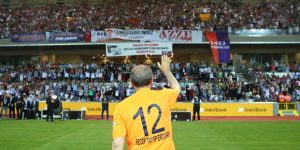Başakşehir: The regime team

In the history of Turkey, there is not a single day that football has not been intertwined with politics. It is already absurd to claim that football, a vastly popular social phenomenon, can be separated from a political context. In Turkey, the relationship between football and politics is far from being disguised; from the day one when young Ottoman-Turkish elites picked up football to pursue ethnic rivalries against the non-Muslim Ottoman communities and later used it to prove Turks’ equivalency to the Western nations to the ministers and mayors becoming club chairpersons, to the 1990s that it has practically triggered a huge wave of popular nationalism, it has always been political. In the last two decades, major football clubs were given a similar status as the Red Crescent Society, they have frequently benefited from tax amnesties, and given valuable real estate. The major football clubs are in debt up to the ears, yet being in a club board is a profitable investment, since it easily connects one to the political top brass, including those in the Presidential Palace.
However, while politics and political actors have always been involved in football, an open favoritism of any club is almost unheard of. Politicians have always been very attentive to enjoying the perks of supporting clubs without offending the others. Even when the favorite club of a prime minister or a president is known, it is usually out of question that club is favored against its rivals. There have been politicians more involved in a single club than others, such Mesut Yılmaz and Mehmet Ağar for Galatasaray in the 90s, or Hikmet Çetin for Beşiktaş and Mehmet Ali Yılmaz for Trabzonspor, especially the most popular four clubs (Beşiktaş, Galatasaray, Fenerbahçe, Trabzonspor) have had similar access to the political world. Even during the first years of Recep Tayyip Erdoğan at the Prime Minister’s office, this rule did not change heavily. Everybody knew that he was a former semi-pro footballer and an avid Fenerbahçe fan, but each club had its own ties to the government.
This unwritten law of football and politics has changed since 2013. During the mass anti-government protests of 2013, especially in Istanbul, football fandom lent its identity, discourse and popularity to the rising wave against Erdoğan and his government. It was not just the participation of such or such fan group to the protests which made a difference, but the emergence of football fandom as a surrogate identity which helped set free the political expressions that were long-kept silent, because of the social stigma against being openly political in Turkey. In a setting where being a political party or a trade union member was frowned upon, doing politics as a football fan was OK. This political expression stemmed from three most emblematic secular neighborhoods of Istanbul; Beşiktaş, Kadıköy and Beyoğlu, and it was as insurmountable as it was shocking for Erdoğan and his yes men dreaming of a cultural hegemony. The witty chants borrowed from football stadiums harbingered a massive cultural defeat for Erdoğan, one he still tries to settle score with.
Since then, the regime tried to keep the “usuals”, secular, middle-class, alcohol-drinking, swearing football fans out of stadiums by security measures, lawsuits, bribing club boards with stadiums and public company sponsorships, and the notorious Passolig e-ticket scheme which basically means donating all your privacy to a pro-Erdoğan bank (along with a hefty fee) to be able attend games. The first few years, the stands were empty but the boycott against Passolig and other shenanigans faded away as clubs recruited world class names who were keen on playing in a competitive league without paying any taxes. Yet, none of these happening changed one thing; the stadiums, especially those in Istanbul, had a secular and an anti-Erdoğan voice.
During the 2014 presidential elections campaign, Erdoğan played the card that was up his sleeve. The municipality club of Istanbul, Istanbul Büyükşehir Belediyesi, was renamed to Istanbul Başakşehir (a heavily conservative neighborhood of Istanbul that was built in the late 1990s when Erdoğan was the mayor) and the opening of Başakşehir Fatih Terim Stadium in 2014 was no less than a circus which involved Turkish Football Federation board members, singers, actors, former and current footballers all working for one person to score goals in a bizarre exhibition game. The Erdoğan fanatic announcer of the pro-government channel airing the game was ecstatic after each goal the presidential candidate scored; “THIS GOAL IS FOR GAZA!” (apparently that was one of those times being pro-Palestine paid off for the regime, unlike those other times they traded with Israel).
Since being rebaptized, Başakşehir is unstoppable. Since being promoted to the Süper Lig in the 2014–15, they have never been outside of the Top 4. Last season, they came really close to clinching the title, finishing the league just behind Beşiktaş. This year, they are once again title contenders. With old but good internationals such as Elia, Clichy, Inler and Adebayor, they have an above-par squad. And what’s more, they have two of the most controversial figures of Turkish football; Emre Belözoğlu and Arda Turan. Emre, former Galatasaray, Fenerbahçe, Inter, Atletico and Newcastle man, is known to spit out racist slur and threaten journalists. Arda, once the beloved ghetto kid of Galatasaray, is now known of his admiration for Erdoğan and also for violently beating up a journalist probably older than his father. Arda’s transfer from Barcelona to Başakşehir is a “new Turkey” story itself, since it was “graciously” sponsored by some kind businesspeople for that Arda could play for Başakşehir.
Everybody knows that Başakşehir is no ordinary club. It is a club with a literal Erdoğan shrine in its stadium, it is a club which retired the 12 number jersey not for its fans, but for Erdoğan. It is the halal version of football soiled by secularism and modern lifestyles. It is another attempt by the regime to take over football.
Yet, Istanbul Başakşehir is no Beşiktaş or Fenerbahçe as the Başakşehir neighborhood is no Kadıköy or Beyoğlu. There is no history, culture, lifestyle to Başakşehir. The whole project will live and die with the regime. That is why nobody, even Erdoğan’s most loyal supporters, is enthusiastic about it. A Başakşehir championship will practically mean nothing to no one.
This fact just recently pushed Erdoğan to make one of the most unforgettable statements of this country’s football history. In his party’s Başakşehir town congress, Erdoğan said “We want Başakşehir to be contender in politics, as in football. But make no mistake. As long as you don’t fill those empty seats at the stadium, I have a question mark in mind. Our youth should fill that stadium. Are we up for it? You are a title contender, those seats should fill. As long as we are not in these fields, we are weak in politics as well. We have to take care of that. You cannot just say ‘I won’t watch that.’ In these fields, the party youth will show itself. In basketball, in football, in swimming. If we are content with fields of our own, we cannot take part in those popular fields.”
This is a first. For the first time, a President of the Republic, even Erdoğan himself, openly declares a football team as of their own political line. These words do not only mean open favoritism in a country where everything is fixed to satisfy the president, it also reveals the frustration of not being able to create an Islamist brand of football fandom. If you ask me, one thing is certain; it is not the empty seats of Başakşehir Fatih Terim Stadium that bother the President, it is the jam-packed bistros of Beşiktaş Köyiçi, Beyoğlu Nevizade or Kadıköy Bağdat Street before each home game of Beşiktaş, Galatasaray and Fenerbahçe. The men and women wearing jerseys, drinking beer and chanting the Kemalist Izmir march as a pre-game ritual…
The Islamist regime in Turkey still tries to conquer Istanbul every single day. Replacing the football fandom culture with a Erdoğan-approved one is obviously harder than demolishing the theater hall at the Taksim Square and building a mosque across the street. That is why football is -and probably will be for some time more- important. It is not only a part of the cultural battle that has been going on for years, it is the centerpiece of it.
